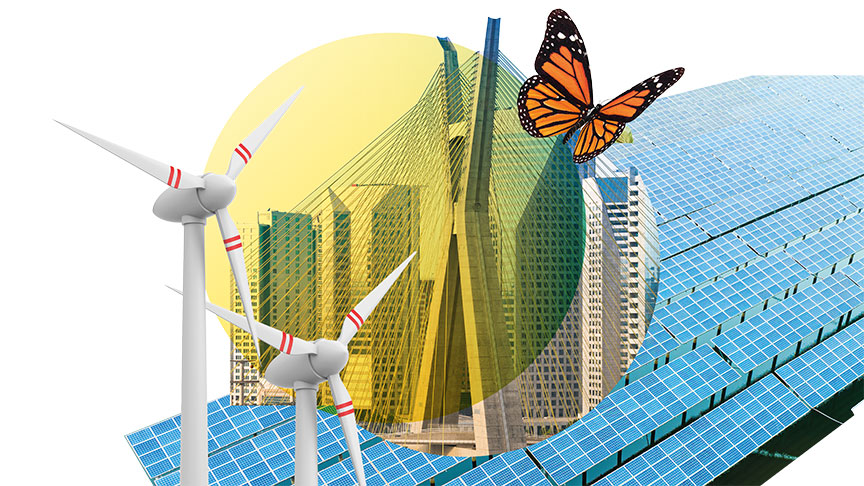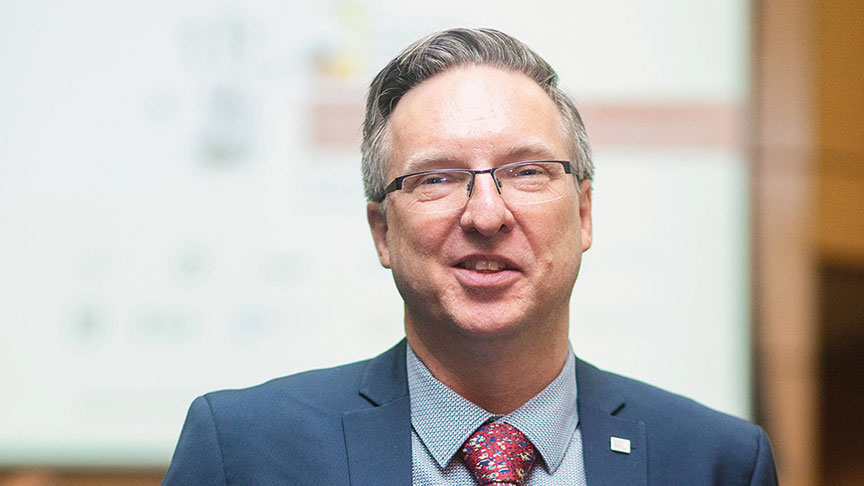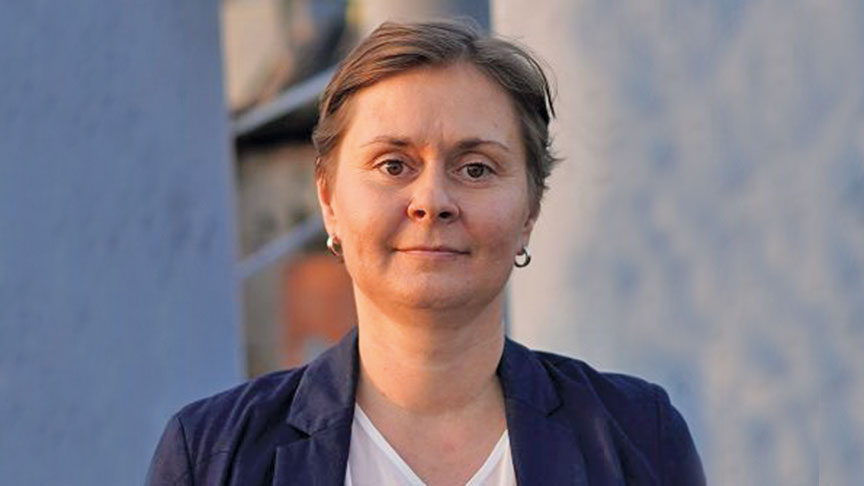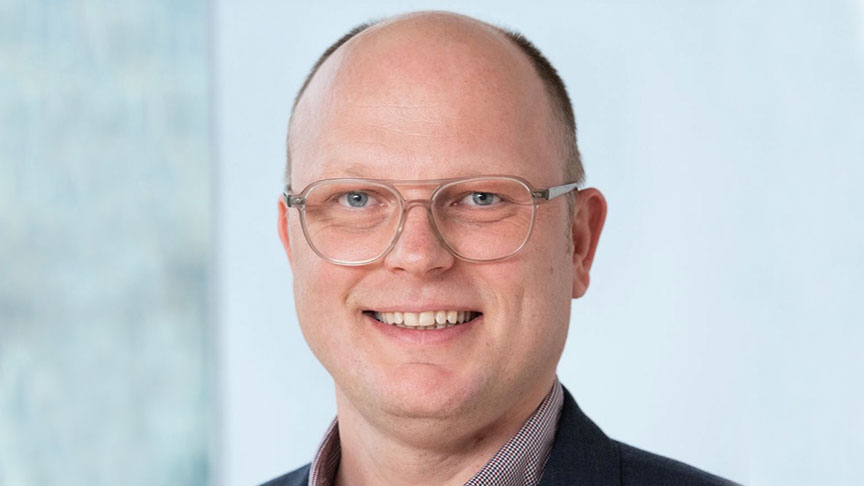Text: Klaus Lüber
Science diplomacy on an equal footing
The considerable potential that closer collaboration between science and diplomacy offers is particularly evident in view of global crises. Read about the important role that the work of the German Centres for Research and Innovation (DWIH) plays in this context.
Professor Veronika Grimm holds the chair in economic theory at Friedrich-Alexander-Universität Erlangen-Nürnberg (FAU). As a member of the German Council of Economic Experts, she exerts direct influence on political decision-making processes in Germany. Professor Grimm’s specialist field is the energy sector. She advocates consistent decarbonisation through electricity generated by renewable energy sources. Wherever this is not possible, green hydrogen is to be used. In this regard, she considers Germany to be reliant on international partnerships.
“We wanted to encourage the two countries to share their ideas and experiences from their respective perspectives.”
Marcio Weichert, Head of Programme at the DWIH São Paulo
Veronika Grimm also adopted this position in her introductory keynote speech at the 10th German-Brazilian Dialogue on Science, Research and Innovation that was held in São Paulo on 16 and 17 May 2023. The event was hosted by the German Centre for Research and Innovation (DWIH) São Paulo. As part of a global network currently comprising six DWIH, it is committed to fostering research cooperation between the two countries. Recently, the DWIH São Paulo has also been focusing increasingly on the political decision-making level.“ In this sense it was naturally ideal that we were able to get Professor Grimm to take part in the Dialogue in her position at the interface between science and policy,” reports Marcio Weichert, Head of Programme at the DWIH São Paulo.
New impetus since 2020
The Dialogue offered Brazilian and German experts in the fields of research, business and industry a platform for discussing the challenges and opportunities of the energy transition. “We wanted to encourage the two countries to share their ideas and experiences from their respective perspectives,” reports Weichert. “Professor Grimm and the other speakers from Germany were not only able to present Germany’s position, they also learnt during the two days how Brazil views the topic. This is of course particularly valuable in terms of an international exchange at the scientific and political levels.” At the end of July 2023, the DWIH was also involved in “Science Diplomacy”, an event organised by the Bayerisches Hochschulzentrum für Lateinamerika (BAYLAT). “We discussed challenges and activities in science diplomacy from a German-Brazilian perspective. In the process, we were able to put researchers, political actors and science and funding institutions in touch with one other.”
What Marcio Weichert describes are two successful examples of science diplomacy, a new and central field of action in German foreign policy that intends above all to improve the interplay between science and policy in tackling global issues. “The challenges of the Anthropocene require international responses to combat climate change, preserve biodiversity, really understand the impact of human activities on ecosystems and on technological change, and to rethink sustainable economic activity and issues of diversity in individual countries’ societies,” explains a Federal Foreign Office Strategy Paper published in late 2020.
Dialogue platform for Indo-German research cooperation
The paper also generated new impetus for the work of the DWIH network, which was established in 2009 to respond to the growing internationalisation of education, science and research and to include industry as an important stakeholder. “For a long time we concentrated mainly on forging research contacts,” reports Dr Katja Lasch, Director of the DWIH New Delhi. “Following the publication of Germany’s foreign science strategy, however, we also readjusted our own role somewhat.” To this end, Lasch and her team developed a series of dialogue formats “in order to initiate conversations about overarching issues, too.” These new formats include for example the “Indo-German Research Day”, a one-day online event that brings together Indian and German research institutions and universities, as well as international funding institutions, to discuss topics relating to science policy.
“Following the publication of Germany’s foreign science strategy we also readjusted our own role somewhat.”
Dr Katja Lasch, Director of the DWIH New Delhi
The event series explores a variety of topics such as gender equality, free access to scientific data and the loss of public trust in science. Participants have the opportunity to discuss these issues and share their ideas and views. “What is crucial is for us to conduct this dialogue together,” says Lasch. “In my opinion, realigning science diplomacy is not about exporting our standpoint to another country but about engaging in discourse on an equal footing.” Lasch explains that the DWIH New Delhi can act as a mediator and translator in this context. Just how effective this role can be in terms of a political lever for change was illustrated by the DWIH director’s recent involvement in a working group that India initiated to promote start-ups within the framework of its G20 presidency.
Global politics on the doorstep
The DWIH New York has access to global politics pretty much on its own doorstep. In the east of Manhattan, in the immediate vicinity of the DWIH’s offices at German House, the United Nations has its headquarters – possibly one of the most important addresses when it comes to negotiating global diplomatic relations. Nonetheless, there is room for improvement with respect to exchange, notes DWIH Head of Programs Dr Jan Lüdert. “We know by now just how important it is in view of the multiple global crises to get science and politics to engage more intensively in exchange in the sense of science diplomacy. We believe that there is still too little institutional integration, however.”
“We believe that there is still too little institutional integration.”
Dr Jan Lüdert, DWIH New York Head of Programs
Lüdert and his team are working hard to change this. He says the first step is to improve interlinking among the stakeholders involved. This is precisely what the network event “Science Diplomacy in International Organizations – Fostering Multilateral Resilience and Driving Sustainable Innovations”, hosted by the DWIH on 30 November 2022, wanted to achieve. Around 30 participants from leading research institutions, the United Nations, universities and non-governmental organisations came together to discuss the role played by the various actors in today’s multilateral world on the one hand, and to identify the importance of science diplomacy for international organisations on the other.
There was also intensive discussion of the potential political limitations to value-based science diplomacy, when it comes for example to dealing with autocracies. Jan Lüdert believes however that it is precisely in challenging contexts that science diplomacy has opportunities to offer, assuming that it is deployed wisely: “In a world in which evidence-based decision-making has come under fire, it is important to remain alert and find ways in which we can view science diplomacy as something positive that can achieve the goals of sustainable development in a meaningful, deliberate and integrative manner.” —
Find out in the interview with Dr Jan Lüdert how DWIH New York wants to promote science diplomacy.




